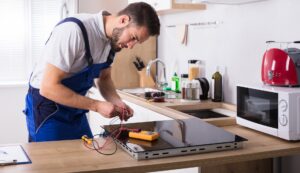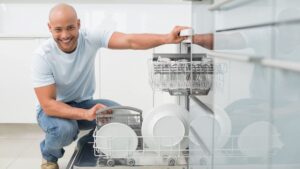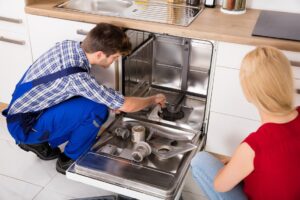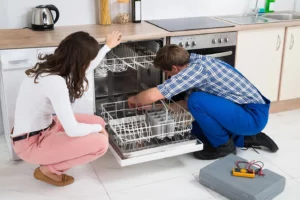In the heart of every kitchen, the stove cooktop and oven stand as culinary workhorses, faithfully serving up our favorite dishes. Yet, like all mechanical marvels, they occasionally encounter hiccups along the way where there is a need for stove cooktop and oven maintenance services.
Whether it’s a burner refusing to ignite, an oven that can’t quite hold its temperature, or the unsettling scent of gas wafting through the kitchen, these common issues can disrupt your cooking routine and even pose safety concerns.
But fear not, for in this comprehensive guide, we’ll not only unravel the mysteries behind these everyday kitchen conundrums but also equip you with the knowledge to prevent them.
From understanding the inner workings of your kitchen appliances to embracing smart maintenance practices and technological advancements in safety, we’ll journey through the landscape of stove cooktops and ovens, leaving no burner unlit or oven unexplored.
So, let’s embark on this culinary adventure, arming you with the insights needed to keep your kitchen appliances running smoothly and safely.
Index:
- Understanding the Anatomy of Your Kitchen Appliances
- The Impact of Routine Maintenance
- Environmental Factors: The Hidden Culprits
- Technological Advances in Appliance Safety
- Common Issues of Stove Cooktop and Oven with solutions
- Major Issues & Stove Cooktop Maintenance Services in Brentwood CA
- Common Issues with Best Oven Maintenance Services in Brentwood CA
- Final Words
Understanding the Anatomy of Your Kitchen Appliances
Before we dive into the intricacies of maintaining and troubleshooting your stove cooktop and oven, it’s crucial to grasp the basics of how these appliances are constructed. This knowledge provides a foundation for understanding their operation and potential issues.
Stove Cooktop Basics
A typical stove cooktop comprises several burners or heating elements. These elements can vary in type:
- Electric Coils
- Ceramic Glass
- Gas Burners
When you turn a burner on, it generates heat, which you use for cooking in pots and pans placed above.
Oven Essentials
An oven, in essence, is a sealed chamber with heating elements, either electric or gas-powered, responsible for generating heat. Ovens offer multiple cooking modes, such as:
- Baking
- Broiling
- Convection
All to accommodate various culinary needs.
By comprehending these fundamental components, you’re better equipped to understand how potential issues may arise and how to address them effectively.
The Impact of Routine Maintenance
Regular maintenance is the unsung hero of appliance longevity. It’s not just about extending the lifespan of your stove cooktop and oven; it’s also about ensuring they perform optimally. Here’s why routine maintenance matters:
- Cleaning and Maintenance Schedule
Creating a cleaning and maintenance schedule is the first step. Regularly clean burners, heating elements, and oven interiors to prevent grease, food residue, and debris buildup.
- Sealing Leaks and Replacing Gaskets
Check for gas leaks around gas cooktops and ensure proper sealing. Replacing damaged gaskets on your oven door is essential for maintaining insulation and heat retention.
- Calibrating Temperature Settings
Use an oven thermometer to verify temperature accuracy. If your oven runs too hot or too cold consistently, consult the user manual for recalibration instructions.
By incorporating these maintenance practices into your kitchen routine, you’re not just preventing common issues but also ensuring your appliances function at their best.
Environmental Factors: The Hidden Culprits
Environmental conditions in your kitchen can significantly influence the performance and lifespan of your stove cooktop and oven:
- Humidity Levels High humidity can lead to corrosion and rust on metal components. Use dehumidifiers or proper ventilation to mitigate this issue, especially in humid climates.
- Temperature Fluctuations Sudden temperature changes can stress your appliances. Avoid rapid cooling after high-temperature use to prevent damage.
- Dust and Grease Accumulation Dust and grease can accumulate on appliance surfaces and in vents, hindering proper airflow and insulation. Regular cleaning and maintenance can prevent this buildup.
- Ventilation Matters Inadequate kitchen ventilation can lead to a buildup of cooking byproducts, such as smoke and grease, settling on the interior components of your oven. Ensure your kitchen has a functioning exhaust fan or hood to address this concern.
Understanding these environmental factors can help you take proactive measures to mitigate their impact on your appliances.
Technological Advances in Appliance Safety
Modern technology has introduced features that enhance safety and reliability in kitchen appliances:
Flame Failure Devices (FFD)
Gas cooktops and ovens often have Flame Failure Devices (FFD) that automatically shut off the gas supply if the flame goes out, preventing gas leaks and hazards.
Oven Temperature Control Systems
Advanced control systems use sensors to maintain precise cooking temperatures, reducing inaccuracies and uneven baking.
Self-Diagnostic Functions
Some appliances can detect and report issues like faulty sensors or heating elements, allowing for early detection and repairs.
Child Locks and Safety Lockouts
Child locks prevent accidental activation by children, while safety lockouts can disable controls to prevent unintended use.
Timer and Delayed Start Functions
These features enable precise cooking times and reduce the risk of overcooking.
Improved Insulation
Modern ovens feature enhanced insulation, maintaining a consistent cooking temperature and reducing heat loss.
Note
While these advancements enhance safety and convenience, routine maintenance and responsible cooking habits remain crucial for preventing common issues.
Common Issues of Stove Cooktop and Oven with solutions
Major Issues & Stove Cooktop Maintenance Services in Brentwood CA
- Burner Not Heating
- Possible Causes: This could be due to a faulty heating element or burner, a problem with the electrical connection, or a malfunctioning control switch.
- Solution: First, ensure the cooktop is properly plugged in or connected to the power source. If that’s not the issue, it may require professional inspection and possible replacement of the faulty component.
- Inconsistent Heat
- Possible Causes: Uneven heat distribution can result from burner clogs, damaged burners, or uneven heating elements.
- Solution: Clean the burners and their ports to remove any blockages. If the problem persists, consider replacing damaged burners or heating elements.
- Clicking Noise
- Possible Causes: Continuous clicking after turning off a burner can be due to moisture or dirt around the burner’s igniter.
- Solution: Allow the area to dry thoroughly and clean any debris around the igniter. If the issue continues, it may require professional inspection. So, look for the best stove cooktop maintenance services in Brentwood CA.
- Gas Smell
- Possible Causes: A gas smell around a gas cooktop is a safety concern and could indicate a gas leak, which is highly dangerous.
- Solution: Immediately turn off the gas supply and ventilate the area. Do not use any open flames or electrical devices. Contact a gas technician or emergency services for immediate assistance.
- Cracked Glass
- Possible Causes: Glass cooktops can crack due to sudden temperature changes, heavy impacts, or manufacturing defects.
- Solution: Replace the cracked glass cooktop with a new one. It’s essential to ensure the replacement is done professionally for safety.
- Broken Knobs
- Possible Causes: Loose or malfunctioning knobs can result from wear and tear.
- Solution: Tighten or replace loose knobs to ensure proper control over the burners.
- Electrical Issues
- Possible Causes: Sparks or burnt wires could be due to faulty wiring or connections.
- Solution: Disconnect the power source immediately and contact a qualified electrician or appliance technician to inspect and repair the electrical issue.
Common Issues with Best Oven Maintenance Services in Brentwood CA
- Temperature Inaccuracy
- Possible Causes: This can result from a malfunctioning thermostat or temperature sensor.
- Solution: Use an oven thermometer to verify the actual temperature. If it’s inaccurate, consider calibrating the thermostat or replacing the faulty sensor.
- No Heat
- Possible Causes: A complete lack of heat can be due to a faulty heating element, a blown fuse, or a malfunctioning control board.
- Solution: Check for blown fuses or tripped circuit breakers. If they’re fine, have a technician inspect the heating element and control board.
- Uneven Baking
- Possible Causes: Uneven heat distribution can lead to uneven baking.
- Solution: Rearrange the oven racks to ensure proper airflow. If the problem persists, it may require professional assessment and repairs. Look for the experts to get the best oven maintenance services in Brentwood CA.
- Door Issues
- Possible Causes: Door problems can occur due to damaged hinges, gaskets, or seals.
- Solution: Inspect and replace damaged components to ensure the oven door seals properly.
- Self-Cleaning Problems
- Possible Causes: High self-cleaning temperatures can damage components or cause malfunctions.
- Solution: Avoid using the self-cleaning feature if it’s causing issues. Instead, manually clean the oven to prevent damage.
- Weird Noises
- Possible Causes: Unusual noises can indicate problems with the oven’s fan, motor, or heating element.
- Solution: Have a technician inspect the oven’s internal components to identify and address the source of the noise.
- Faulty Timer or Controls
- Possible Causes: Malfunctions in the control panel or timer can disrupt cooking and baking.
- Solution: Replace or repair the faulty controls as needed to restore proper functionality.
- Gas Oven Ignition Issues
- Possible Causes: Difficulty igniting the gas can be due to a faulty igniter or gas valve.
- Solution: Have a qualified technician inspect and replace the defective components.
- Foul Smells
- Possible Causes: Persistent odors, especially burning or electrical smells, could indicate a problem.
- Solution: Turn off the oven, unplug it, and have it inspected by a professional to identify and resolve the issue.
- Excessive Smoke
- Possible Causes: Smoke during normal use may result from food residue or a malfunctioning heating element.
- Solution: Clean the oven thoroughly to remove any food residue. If the issue persists, have the heating element inspected and replaced if necessary.
Final Words:
By understanding the anatomy of these kitchen staples, appreciating the significance of routine maintenance, and adopting cooking habits that promote appliance health, you can significantly reduce the likelihood of encountering common issues.
Be mindful of environmental factors and embrace technological advances designed to enhance safety and convenience. Also, make sure to get professional stove cooktop and oven maintenance services if you aren’t aware how to get rid of these issues.
Remember that troubleshooting tips can often resolve minor problems, while proper installation ensures safety and functionality from the start. In the rare event of a gas leak, swift and decisive action is paramount.






